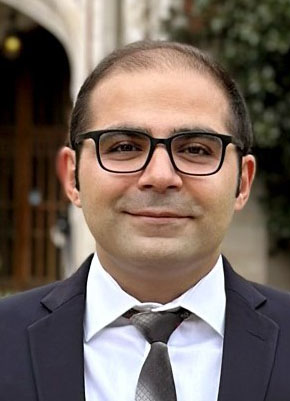Catching Up with Kasra: A Q&A with Our New Economics Professor
Catching Up with Kasra:
A Q&A with Our New Economics Professor
 In early 2025, we met up with Kasra Khademorezaian, one of our newest faculty members from the Department of Economics, fresh off his first semester teaching as an assistant professor at SUNY New Paltz. Kasra, who received his doctorate in economics from the University of Oklahoma, focuses much of his work on industrial organization and microeconomics, with a beat on commercial airlines, auctions and the NFT market.
In early 2025, we met up with Kasra Khademorezaian, one of our newest faculty members from the Department of Economics, fresh off his first semester teaching as an assistant professor at SUNY New Paltz. Kasra, who received his doctorate in economics from the University of Oklahoma, focuses much of his work on industrial organization and microeconomics, with a beat on commercial airlines, auctions and the NFT market.
Tell me something interesting about yourself and what drew you to working here at SUNY New Paltz?
“Any sort of problem—I like solving it. I don’t care if it’s a car, a watch, a data issue, anything really. With SUNY New Paltz, it’s a very good location and it’s not in the city. With bigger universities, especially with Economy courses, you don’t get the interaction with students. When I was doing my PhD in Oklahoma, we had classes that were 400-500 students. It’s not the traditional class experience that you’d think it would be. But with New Paltz, the smaller class size is a benefit.”
What courses did you teach during the fall semester, and did you enjoy them?
“I taught principal and intermediate level microeconomics, which was nice because that’s what I like to teach. It was very interesting. With principal classes, you get a mix of everybody—computer science, economy, finance, marketing, philosophy, art. A lot of students from different disciplines. These courses give them some tools to figure out things for themselves. It’s not my job to tell them how to think. The job is to tell them the way of thinking. Decision making, in general, is the topic.”
How do you get—and keep—your students engaged in the classroom?
“Dad jokes are really a thing. You have to have a list of dad jokes. Sometimes, if you have current events like the election or congestion pricing, we will discuss them in all my classes because it’s a very good tool to explain things—any news that students have exposure to. It could be why Taylor Swift uses her private jet instead of going to the airport. Is it less expensive or more expensive? Is she doing it because it’s nicer or because the airport would be too disruptive? Students have exposure to these things. When you discuss them, they see why they’re taking these courses.”
Your interests include auctions, airlines, and the NFT market. Why do these intrigue you?
“I wanted to know why people are paying so much money for things like NFTs. What drives them to pay these astronomical numbers? How do people think about these and what are their values? The NFT market is relatively new, and I don’t think it’s going anywhere. People thought that no one would care about them in a year, and it was all a scam. It’s interesting to see why, for example, an NFT of someone dancing or an animated kitty costs $5 million when you can buy a Monet for that price.”
What are you looking forward to the most in the spring semester?
“I’ll be teaching Industrial Organization, which is very interesting. It’s a 400-level course, so I’m trying to figure out a couple of ways to keep students engaged. It’s challenging the more complicated things get, and it’s also harder to explain in plain language. My plan for now is to run the course in a more empirical way, cover some theory, and also have some hands-on experience. I hope that it gives students more confidence when they’re going into the job market. They’ll know that they’ve worked with data. If they’re asked to do some data science or analysis, they can do it.”
What advice or words of wisdom would you give to new incoming faculty?
“I don’t know; I’m too new to give advice. My advice would be to not give advice too soon. The best advice that people gave me—and that I’ll probably give to anybody else—is to not assume anything. Read the room. If you’re saying something and everyone is looking at you like you’re not making sense, you might have to do some more review of the material they’re already supposed to know.”
